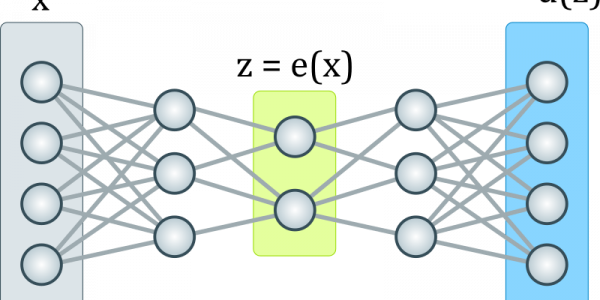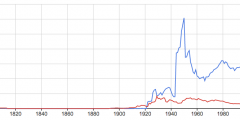The genome as autoencoder: A new biological metaphor
July 28, 2024
I am just back from a walk thinking about Kevin Mitchell and Nick Cheney’s recent paper (preprint) on the genome as autoencoder, rather than a blueprint or recipe. This paper caused quite a stir and you can find a good summary in this post by Jessica Hamzelou for the MIT Technology Review. Walking along, I …
A new language for a new biology? Let’s talk about it!
June 14, 2024
Philip Ball has written a book that introduces lay readers to entirely new dimensions of biology and reveals the intricate complexity of living organism: How Life Works. In the process of detailing the biological complexities of life, Phil also does something else; he scrutinises old ways if talking about life and takes apart old metaphors …
Genes, trains and eureka-moments
March 8, 2024
I was in the process of writing a blog post on metaphors in genetics and genomics which was getting longer and longer and I had some personal stuff to deal with. So, I stopped. I might come back to this another time. In the process of writing, I discovered that trains have been quite an …
Evelyn Fox Keller (1936-2023)
September 25, 2023
On 22 September 2023 Evelyn Fox Keller sadly passed away at the age of 87. She had been a theoretical physicist, a mathematical biologist, a feminist philosopher, a historian of science, and an inspiration to many across these fields. She integrated insights from all these fields creatively and critically, and, most importantly, she added some …
Astrogenomics: Integration and inspiration
November 1, 2019
I should have blogged about embryo editing in Russia. I should have blogged about Netflix’s ‘Unnatural selection’ series on CRISPR and genome editing. I should have blogged about prime editing, but life is getting in the way at the moment. That doesn’t mean I don’t look at twitter once in a while (au contraire!). So, …
New genetics and society: A retrospective
June 7, 2019
I am in a collecting mood at the moment [I have updated this collection/blog post on 17 January 2022 and on 8 October 2024]. When I heard that an article (with Carmen McLeod and Rusi Jaspal) on faecal microbial transplants had finally been accepted by New Genetics and Society, I began to count back and …
Blueprint, a broken metaphor?
November 26, 2018
Three things came together that made me write this post: observing an increased discussion of the blueprint metaphor in genetics and genomics around the publication of a book called Blueprint, reading an old article by George Gamow, and reading a footnote in a forthcoming book by Philip Ball entitled How to Build a Human. The …
Genome editing, metaphors and language choices
November 17, 2017
Genetic Alliance and the Progress Educational Trust recently published a report entitled ‘’Basic understanding of genome editing”, based on research supported by the Wellcome Trust. As I have worked on metaphors relating to genetic, genomics and genome editing for more than twenty years, I was particularly interested in this report. Unlike many other publications, including …
Do metaphors really matter?
June 16, 2017
I, like many others, from Leibniz to Lakoff, think that metaphors are important for human thinking and acting. They make us see the world in different ways – for good or evil. So, one should keep an eye on them. Recently I have read two articles which seem to imply that metaphors matter less than …
Biosocial: A brief conceptual history
April 21, 2017
I have recently come across the word ‘biosocial’ in various social science debates about epigenetics and other advances in the life- and bio-sciences. A chapter in a book on ‘social epigenetics’ (and the ‘biosocial’) says for example: “Epigenetics has considerable potential to transform social science by embedding mutually regulative reciprocal connections between biological and social …
Subscribe by email
About this blog
This blog promotes discussion of topics related to the research programme 'Making Science Public: Challenges and Opportunities'. Our purpose is not to 'make science public'. Instead, we want to study the opportunities that have emerged for science to be more openly practiced and debated, but also the challenges posed by making science public or by promoting the making public of science as a solution to a variety of problems in society and in politics.
This blog will report on these and other issues related to the Leverhulme funded research programme: Making Science Public: Challenges and Opportunities
Useful links
Recent Posts
- Climate change and climate discourse: A dual disintegration
- Erving Goffman: Memories, method and metaphors
- Participation at the core: AI, ELSI and community engagement
- Understanding computational hermeneutics: Making meaning between the past and the present
- AI winter and AI bubble: Historical and metaphorical reflections
 MSP bookmarks
MSP bookmarks
- Twitter May 8, 2017
- Social innovations in Europe #RRI November 3, 2015
- Harvey Graff, the undisciplinarian September 20, 2015
- Replacing Pesticides With Genetics August 31, 2015
- Addressing hazardous chemicals in the circular economy August 25, 2015
Categories
- antibiotics
- anticipatory governance
- artifical intelligence
- big data
- biotechnology
- citizen science
- Climate Change
- Climate Politics
- co-production
- coronavirus
- Creationism
- Definition of Science
- designer babies
- disease
- disease
- engineering
- epigenetics
- Food Security
- Food sovereignty
- gene drive
- genomics
- GM Food
- GMOs
- history of science
- Hype
- images and visualisations
- imaginaries
- Immigration
- Impact
- infectious diseases
- innovation
- interdisciplinarity
- Knowledge Society
- Language
- Markets
- Metaphors
- microbiome
- neoliberalism
- Neuroscience
- open access
- Personal Reflection
- Politics
- Public education
- public engagement with science
- public needs
- public participation
- public policy
- public service
- publics
- regulatory science
- Religion
- Republican Party
- research impact
- responsible innovation
- responsive research
- Richard Dawkins
- risk
- Scepticism
- Science
- Science and Government
- science and politics
- Science and Songs
- science communication
- Science Communication
- Science Fiction
- Science Policy
- Social science
- sociology
- space
- space exploration
- synthetic biology
- transparency
- Trust
- Uncategorized
- Uncertainty
- visualisation
- wonder









